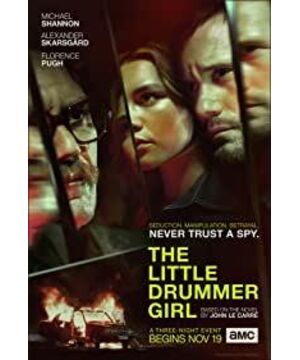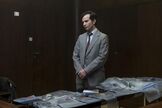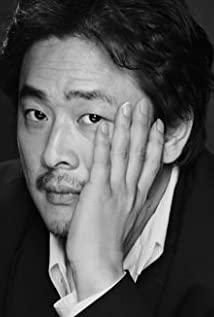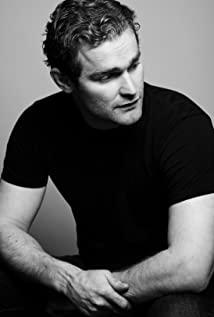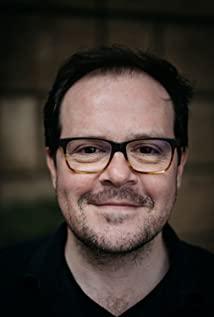In the spy novel "The Little Drum Girl," the Palestinian terrorist leader Khalil said, "Without women, I would be deprived of human emotion, and I would be an unqualified warrior." John Le Carre did not give This terrorist, who is good at carrying out bombing attacks, arranges the drama of love. But after Park Chan-wook put the novel on the screen, he put it on the underwear of love.
Every film and television adaptor has his own considerations for art. Of course, Park Chan-wook is no exception.
"Little Drum Girl" is 500 pages long, and condensing it into only six episodes of the TV series was not an easy task for the adaptors.
"Female Drummer" is highly consistent with the original work, even the details are not spared, but the ending has been changed.
We all know that at the end of the show, Charlie and Joseph (Gardy Baker) finally reunite.
And the last scene makes the audience full of infinite imagination about the love of these two people...
With this open ending, we cannot rule out that Park Chan-wook made such a change based on the need for a second season. Because, Marty Kertz, who perfectly planned this true spy stage show, pre-buried a story line in the final episode: Although Khalil was killed by Joseph, the real demon could not be stopped. Other remnants of terrorists still exist, and it is very likely that Charlie and Joseph will join forces again in the second season... (If it is true, I really want to see what Park Chan-wook will do next)
If "The Drummer" is a spy drama wrapped in the core of love, then the original "The Little Drummer" has already surpassed the spy novel in the ordinary sense.
At the end of the novel, Charlie returns to his old life, still playing those fictional characters on stage.
When Joseph found her, Charlie said: I'm dead, Joseph, you shot, don't you remember?
In Charlie's real life stage, the real ending is that she's dead.
As John Le Carré said in the preface to this novel: This story will not be out of date today, tomorrow or the day after. And, the story continues to make—as in my book, the heroine, Charlie, who is torn to shreds by a war between two warring nations, who both present themselves as the embodiment of justice.
Correct injustice with injustice, fight violence with violence, until all innocents are reduced to pieces. This is where the original "Little Drum Girl" deserves our reflection. John Le Carre, who worked in British intelligence, saw every innocent person like Charlie die because of the war. John Le Carré seems to be describing the Israeli-Palestinian conflict, but in fact he is anti-war and calls for peace.
This is also where I think the original book is higher than the TV series...
Of course, here, it is difficult for us to compare who is better between novels and film and television dramas. American film researcher George Broston said: "An art (film) whose limitations are derived from active images, large audiences, and industrialized methods of production, and another art (fiction) whose limitations are derived from language, a limited number of readers, and the way an individual creates; the difference between the two is inevitable. In short, a novel, when made into a film, will inevitably become a complete art completely different from the novel on which it is based. Taste."
The adaptation of "The Female Drummer" caters more to the viewing needs of the public today (not the level of artistic appreciation). There are market factors in it.
Because no audience will reject the drama of love.
In this regard, Ian McEwan is quite astute. After Joe Wright turned his novel into a film of the same name, Atonement, it was considered "a perfect film derived from a perfect book".
Just imagine that Robbie and Cecilia's love road will not be smooth under the different family growth and World War II war background set by Ian McEwan. The family class, the change of the war situation, are all tangible shackles for the couple.
However, Ian McEwan created the plot of his sister Briony's meddling, and let us brood. Because of a mistake, the two of them have only the only remaining warmth in the library in their lives.
It can be said that with the construction of this storyline, Ian McEwan is enough to make people unforgettable about the love of Robbie and Cecilia.
...
Plus, John Callan turned Maugham's "The Veil" into a heartbreaking love story when he brought it to the big screen.
After discovering Katie's infidelity, Walter desperately takes Katie to a remote cholera-ravaged town to get revenge and to restore their marriage, where the two of them open up and grow closer.
However, Walter contracted cholera and eventually died, Katie faced the invitation of her old lover, she resolutely refused.
In the novel, Walter never forgave Katie until his death, and Katie never fell in love with Walter. After Walter died, Katie, who was no longer so pretty, saw her old lover. Although she was full of contempt, she still slept with him under the drive of desire. She despised her lustful self... but in the end she was pregnant with her old lover's flesh and blood. Katie said: "I want to raise my daughter to be a free and self-reliant person. I brought her into this world, loved her, and raised her, not to let her sleep with which man in the future, and to depend on him for the rest of my life. This monologue is Maugham's sign of Katie's spiritual sublimation from the beginning of love and vanity to the final spiritual sublimation.
Novels focus on female spiritual awakening, while movies focus on depicting love.
In terms of film and television adaptation, "The Veil" is undoubtedly a success, because it is more in line with the public's expectations for love.
...
In other words, film and television creators know exactly where the audience's appetite will be the most. During the viewing process, our audience will involuntarily immerse themselves in the characters and obtain those alternative experiences that are difficult to experience in daily life. The more tragic, regretful, and crippled, the stronger the experience.
All the love that has been remembered in the hearts of the past and the present is a tragedy. "Casablanca", "Blue Bridge", "Gone with the Wind", "Last Dream of the Covered Bridge" and "Titanic" all end in tragedy...
You have to admit that when we are watching love, what we need is that the lover is endless, but not a family. Because of the tragedy, the joys abound are even more disturbing.
This reminds me of the reunion scene of Charlie and Joseph in "The Drummer" again... Where do you think their love and future are for the two who have gone through the storm of espionage?
First published on the public account [Park Yan]
View more about The Little Drummer Girl reviews


